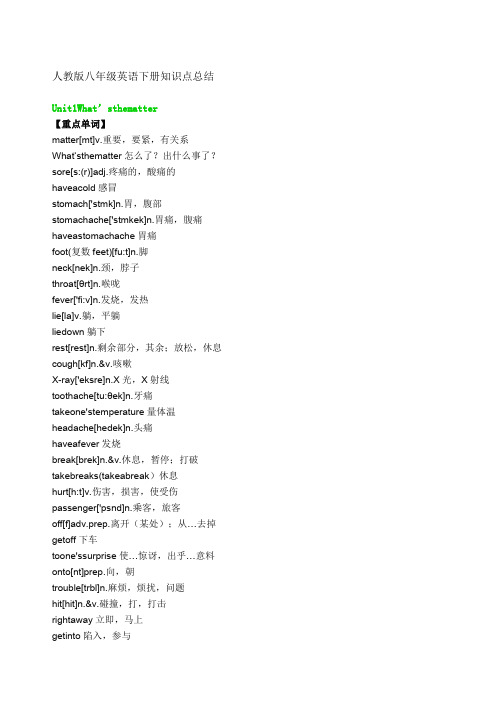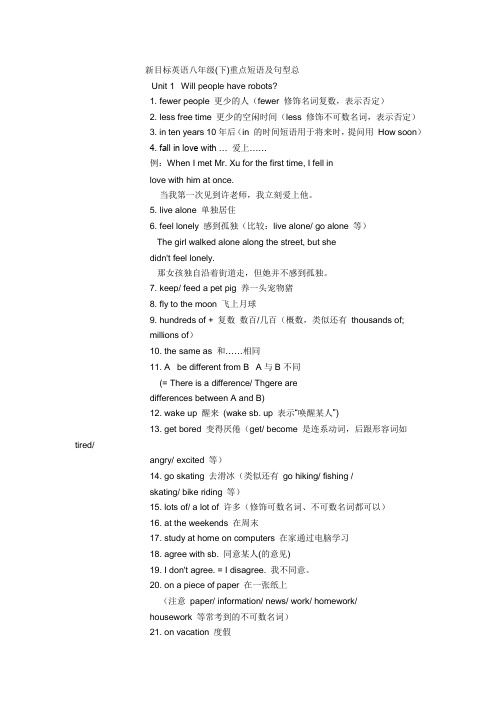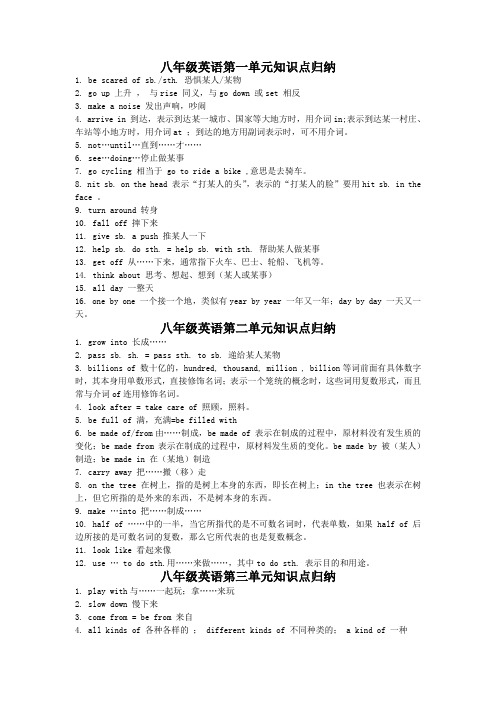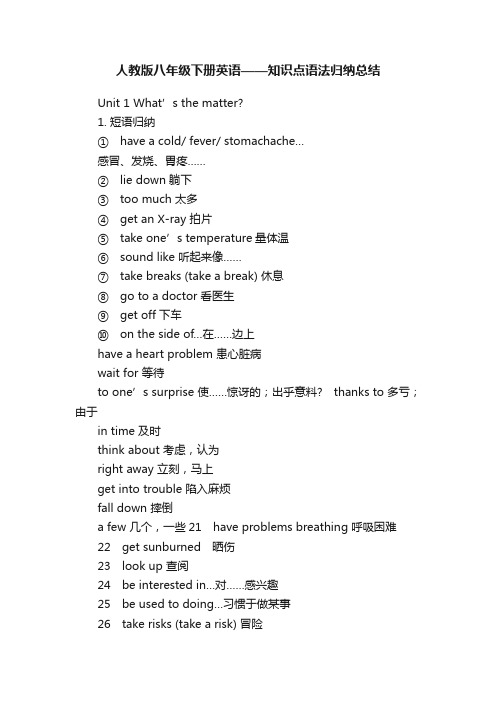人教版八年级英语 (下)知识讲解
人教版初二(下)英语unit1 what's the matter知识点讲解与练习

八年级下册英语Unit 1 what’s the matter?词汇篇学生通过本讲学习,能够掌握本单元的重点词汇句型,并在综合能力上有一定的拓展。
1.matter的用法(1)名词:事情,问题What’s the matter? =what’s wrong (with you)? =what’s the trouble怎么啦?出什么事啦?(2)动词:有重大影响,有重要性如:What does it matter?2.疾病的表达法have a cold/a fever/ a toothache/ a stomachache3.take 的固定搭配take one’s temperature/ take breaks/ take risks/take some medicine/take off/ take care of/take away 4.surprise的用法1.做名词:to one’s surprise 使。
惊讶的,出乎。
意料2.做动词:surprise sb使某人吃惊3.做形容词:surprising, surprised的用法5.get的用法get off下车/get on上车/get into陷入,参与6.be used to sth/doing sth 习惯于做某事be used to do sth 被用作去做某事used to do sth 习惯于做某事7.out of的固定搭配look out of 向。
外看/ get out of从。
出来/ run out of用光基础演练1.---What’s wrong ______you?---I fell off the bike and hurt my leg.A. ofB. withC. forD. by2.Tom and Jenny enjoyed _________playing computer games.A. himselfB. herselfC. ourselvesD. themselves3. Sally became interested ___________science and wanted to be a scientist.A. forB. inC. throughD. at4. ---I had a __________.---You’d better go to see a dentist.A. headacheB. feverC. coldD. toothache5. I didn’t _________my temperature, but I knew I had a fever.A. giveB. setC. takeD. show二、根据汉语意思翻译句子。
人教版八年级英语下册知识点总结

人教版八年级英语下册知识点总结Unit1What’sthematter【重点单词】matter[mt]v.重要,要紧,有关系What’sthematter怎么了?出什么事了?sore[s:(r)]adj.疼痛的,酸痛的haveacold感冒stomach['stmk]n.胃,腹部stomachache['stmkek]n.胃痛,腹痛haveastomachache胃痛foot(复数feet)[fu:t]n.脚neck[nek]n.颈,脖子throat[θrt]n.喉咙fever['fi:v]n.发烧,发热lie[la]v.躺,平躺liedown躺下rest[rest]n.剩余部分,其余;放松,休息cough[kf]n.&v.咳嗽X-ray['eksre]n.X光,X射线toothache[tu:θek]n.牙痛takeone'stemperature量体温headache[hedek]n.头痛haveafever发烧break[brek]n.&v.休息,暂停;打破takebreaks(takeabreak)休息hurt[h:t]v.伤害,损害,使受伤passenger['psnd]n.乘客,旅客off[f]adv.prep.离开(某处);从…去掉getoff下车toone'ssurprise使…惊讶,出乎…意料onto[nt]prep.向,朝trouble[trbl]n.麻烦,烦扰,问题hit[hit]n.&v.碰撞,打,打击rightaway立即,马上getinto陷入,参与herself[h:self]pron.她自己,她本身(she的反身代词)bandage['bndd]n.&v.绷带;用绷带包扎sick[sk]adj.患病的,不适的knee[ni:]n.膝盖nosebleed[nzbli:d]n.鼻出血breathe[bri:e]v.呼吸sunburned[snb:nd]adj.晒伤的ourselves[ɑ:selvz]pron.我们自己(we的反身代词)climber[klam(r)]n.登山者beusedto习惯于…适应于…risk[rsk]n.&v.风险,危险;冒险takerisks(takearisk)冒险accident[ksidnt]n.意外事件;事故situation[sitjuein]n.状况,形式,情况kg=kilogram[klgrm]n.公斤,千克rock[rk]n.岩石runout(of)用尽,耗尽knife[naif]n.刀,餐刀cutoff切除blood[bld]n.血mean[mi:n]v.意味着,意思是,意欲getoutof离开,从…出来importance[mp:tns]n.重要性decision[d'sn]n.决心,决定,抉择control[kn'trl]v.控制,支配,操纵beincontrolof掌管,管理spirit['sprt]n.勇气,意志death[deθ]n.死亡giveup放弃nurse[n:s]n.护士【重点短语】1.haveafever发烧2.haveacough咳嗽3.haveatoothache牙疼4.talktoomuch说得太多5.drinkenoughwater喝足够的水6.haveacold受凉;感冒7.haveastomachache胃疼8.haveasoreback背疼9.haveasorethroat喉咙痛10.takerisks冒险11.hotteawithhoney加蜂蜜的热茶12.seeadentist看牙医13.getanX-ray拍X光片14.takeone’stemperature量体温15.putsomemedicineonsth.在……上面敷药16.giveup放弃17.soundlike听起来像18.allweekend整个周末19.inthesameway以同样的方式20.gotoadoctor看医生21.goalong沿着……走22.onthesideoftheroad在马路边23.shoutforhelp大声呼救24.withoutthinkingtwice没有多想25.getoff下车26.haveaheartproblem有心脏病27.toone’ssurprise另某人惊讶的是28.thanksto多亏了;由于29.intime及时30.makeadecision做出决定31.getintotrouble造成麻烦32.rightaway立刻;马上33.becauseof由于34.getoutof离开;从……出来35.keepondoingsth.继续或坚持做某事36.putabandageonsth.用绷带包扎37.falldown摔倒38.feelsick感到恶心39.haveanosebleed流鼻血40.cuthisknee割伤他的膝盖41.putherheadback把她的头向后仰42.haveproblemsbreathing呼吸困难43.mountainclimbing登山运动44.beusedtodoingsth.习惯做某事45.runout(of)用完;用尽46.sothat以便47.so...that...如此……以至于...…48.beincontrolof掌管;管理49.inadifficultsituation在闲境中【重点句型】1.What'sthematterwithyou=What'thetroublewithyou=What'swrongwithyou你怎么了?2.Whatshouldshedo她该怎么办呢?3.ShouldItakemytemperature我应该量一下体温吗?4.Youshouldliedownandrest.你应该躺下休息一会儿。
人教版八年级英语下册各知识点归纳总结(最新最全)

人教版八年级英语下册各知识点归纳总结Unti1 what’s the matter?短语归纳1.too much 太多2.lie down 躺下3.get an X-ray 做个X光检查4.take one ’s temperature 量体温5.put some medicine on ......在....上敷药6.have a fever 发烧7.take breaks /take a break 休息 8.without thinking twice 没多想9.get off 下车 10.take sb to the hospital 送某人去医院11.wait for等待 12.to one’s surprise 使.......惊讶的13.thanks to多亏于;由于 14.in time及时15.think about 考虑 16.have a heart problem患有心脏病用法归纳1.need to do sth .需要去做某事2.see sb doing sth 看见某人正在做某事3.ask sb sth 询问某人某事4.expect sb to do sth 期望某人做某事5.agree to do sth 同意做某事6.help sb (to) do sth 帮助某人做某事7.want to do sth 想要做某事 8.tell sb to do sth 告诉某人做某事9.have problems(in) doing sth 做某事有困难 e sth to do sth用某物去做某事语法点1.询问某人的健康问题及遇到麻烦的表达方法2.情态动词should的用法3.不定代词的用法精细解读1. What’s the matter (with you)? 怎么了?出什么事了?What’s the trouble/ the problem / wrong with sb./ sth.?2. I had a cold.我感冒了。
人教版八年级英语下册各单元知识点总结完整版

Unit 1 What’s the matter?一、重点短语1. have a fever 发烧2. have a cough 咳嗽3. have a toothache 牙疼4. talk too much 说得太多5. drink enough water 喝足够的水6. have a cold 受凉;感冒7. have a stomachache 胃疼8. have a sore back 背疼9. have a sore throat 喉咙痛10. lie down and rest躺下来休息11. hot tea with honey加蜂蜜的热茶12. see a dentist看牙医13. get an X-ray拍X光片14. take one’ s temperature量体温15. put some medicine on sth在……上面敷药16. feel very hot 感到很热17. sound like 听起来像18. all weekend 整个周末19. in the same way以同样的方式20. go to a doctor 看医生21. go along 沿着……走22. on the side of the road 在马路边23. shout for help 大声呼救24. without thinking twice 没有多想25. get off 下车26. have a heart problem 有心脏病27. to one’ s surprise 使……惊讶的28. thanks to 多亏了;由于29. in time及时30. save a life 挽救生命31. get into trouble 造成麻烦32. right away 立刻;马上33. because of 由于34. get out of 离开35. hurt oneself 受伤36. put a bandage on sth. 用绷带包扎37. fall down 摔倒38. feel sick 感到恶心39. have a nosebleed 流鼻血40. cut his knee割伤他的膝盖41. put her head back 把她的头向后仰42.have problems breathing呼吸困难43. mountain climbing登山运动44. be used to doing sth. 习惯做某事45. run out (of) 用完;用尽46. so that 以便47. so…that 如此……以至于……48. be in control of 掌管;管理49. in a difficult situation 在逆境屮50. keep on doing sth.坚持做某事51. make a decision做出决定52. take risks 冒险53. give up 放弃二、知识点解析1. What’s the matter? 怎么了?若是询问“某人怎么了?”要用“What’s the matter with sb.?”拓展:What’s the matter with sb.? 的同义句:What’s wrong with sb.? / What’s the trouble with sb.?2.疾病类短语:have a +疾病. e.g. :have a fever 发烧have a cold 感冒have a cough 咳嗽.have a +身体部位-ache. e.g.: have a headache 头痛have a toothache 牙痛.have a sore+身体部位. e.g.: have a sore throat咽喉痛have a sore back背痛例题:Mom, I____________.I’m sorry to hear that, dear. We must go to see the dentist right away.A. have a headacheB. have a stomachacheC. have a toothacheD. have a fever3. lie down 躺下V. 躺,平躺。
人教版八年级下册各单元英语语法解析知识重点总结

新目标英语八年级(下)重点短语及句型总Unit 1 Will people have robots?1. fewer people 更少的人(fewer 修饰名词复数,表示否定)2. less free time 更少的空闲时间(less 修饰不可数名词,表示否定)3. in ten years 10年后(in 的时间短语用于将来时,提问用How soon)4. fall in love with … 爱上……例:When I met Mr. Xu for the first time, I fell inlove with him at once.当我第一次见到许老师,我立刻爱上他。
5. live alone 单独居住6. feel lonely 感到孤独(比较:live alone/ go alone 等)The girl walked alone along the street, but shedidn't feel lonely.那女孩独自沿着街道走,但她并不感到孤独。
7. keep/ feed a pet pig 养一头宠物猪8. fly to the moon 飞上月球9. hundreds of + 复数数百/几百(概数,类似还有thousands of;millions of)10. the same as 和……相同11. A be different from B A与B不同(= There is a difference/ Thgere aredifferences between A and B)12. wake up 醒来(wake sb. up 表示“唤醒某人”)13. get bored 变得厌倦(get/ become 是连系动词,后跟形容词如tired/angry/ excited 等)14. go skating 去滑冰(类似还有go hiking/ fishing /skating/ bike riding 等)15. lots of/ a lot of 许多(修饰可数名词、不可数名词都可以)16. at the weekends 在周末17. study at home on computers 在家通过电脑学习18. agree with sb. 同意某人(的意见)19. I don't agree. = I disagree. 我不同意。
人教版八年级下册英语知识点总结(最新最全)

八年级英语第一单元知识点归纳1. be scared of sb./sth. 恐惧某人/某物2. go up 上升,与rise 同义,与go down 或set 相反3. make a noise 发出声响,吵闹4. arrive in 到达,表示到达某一城市、国家等大地方时,用介词in;表示到达某一村庄、车站等小地方时,用介词at ;到达的地方用副词表示时,可不用介词。
5. not…until…直到……才……6. see…doing…停止做某事7. go cycling 相当于 go to ride a bike ,意思是去骑车。
8. nit sb. on the head 表示“打某人的头”,表示的“打某人的脸”要用hit sb. in the face 。
9. turn around 转身10. fall off 摔下来11. give sb. a push 推某人一下12. help sb. do sth. = help sb. with sth. 帮助某人做某事13. get off 从……下来,通常指下火车、巴士、轮船、飞机等。
14. think about 思考、想起、想到(某人或某事)15. all day 一整天16. one by one 一个接一个地,类似有year by year 一年又一年;day by day 一天又一天。
八年级英语第二单元知识点归纳1. grow into 长成……2. pass sb. sh. = pass sth. to sb. 递给某人某物3. billions of 数十亿的,hundred, thousand, million , billion等词前面有具体数字时,其本身用单数形式,直接修饰名词;表示一个笼统的概念时,这些词用复数形式,而且常与介词of连用修饰名词。
4. look after = take care of 照顾,照料。
5. be full of 满,充满=be filled with6. be made of/from由……制成,be made of 表示在制成的过程中,原材料没有发生质的变化;be made from 表示在制成的过程中,原材料发生质的变化。
Unit4知识点讲解课件人教版八年级英语下册

● —Right. 5G willan ever.
● A. download
B. downloads C. to download D. downloading
● 2. Jenny is afraid to travel by plane. She always feels it.
●
●municate ●考点:① v.交流;沟通 ● ② communication n.交流;沟通 ●搭配: ●communicate with sb与某人交流 ●=have a communication with sb
●3.elder
●考点:① adj.年级较长的
●
② old--elder-eldest
B. because
C. or
D. so that
● 4. —How will she deal with the work?
● —She doesn't want to do it by herself. She wants to ask someone else to do it, .
● A. yet
B. instead C. too
D. either
● (一)单项选择
● 5. Lucy drank sleepy.
coffee so she couldn't sleep well last night. Today she feels
● A. too much; much too B. too much; too much
人教版英语八年级下册
Unit 4 Why don’t you talk to your parents? 知识点详解
By Nancy
人教版八年级下册英语——知识点语法归纳总结

人教版八年级下册英语——知识点语法归纳总结Unit 1 What’s the matter?1. 短语归纳①have a cold/ fever/ stomachache…感冒、发烧、胃疼……②lie down 躺下③too much 太多④get an X-ray 拍片⑤take one’s temperature量体温⑥sound like 听起来像……⑦take breaks (take a break) 休息⑧go to a doctor 看医生⑨get off 下车⑩on the side of…在……边上have a heart problem 患心脏病wait for 等待to one’s surprise 使……惊讶的;出乎意料? thanks to 多亏;由于in time 及时think about 考虑,认为right away 立刻,马上get into trouble 陷入麻烦fall down 摔倒a few 几个,一些21 have problems breathing 呼吸困难22 get sunburned 晒伤23 look up 查阅24 be interested in…对……感兴趣25 be used to doing…习惯于做某事26 take risks (take a risk) 冒险27 lose one’s life 丧生28 became of 因为29 run out (of) 用尽,耗尽30 be ready to do sth. 准备做某事31 cut off 切除32 climb down 爬下33 get out of 离开;从……出来34 tell of 讲述35 the importance of (doing sth.) (做某事的)重要性36 be in control of 掌管,管理37 make a decision 做决定38 keep on doing sth. 坚持做某事39 give up 放弃40 cut/ hurt oneself 使自己受伤2. 典句必背①What’s the matter?②I have a stomachache.③What should I do?④Should I take my temperature?⑤I think you should lie down and rest.⑥If your head and neck still hurt tomorrow, then go to a doctor.⑦His love for mountain climbing is so great that he kept on climbing mountains even after this experience.3. 用法集萃(1) 当别人心情不好,身体不适或遇到麻烦时,我们可以用如下表达表示关心:What’s the matter?What’s the matter with you?What’s wrong with …?What’s the trouble\problem with …?(2) 英语中常用have描述身体的不适,此时have意为“患有”,常用结构:①have a + 疾病例:have a cold 感冒;have a fever 发烧;have a cough 咳嗽②have a + 身体部位-ache例:have a headache 头痛;have a toothache 牙痛③have a sore + 身体部位例:have a sore throat 咽喉痛;have a sore back 背痛(3) lie down躺下;tell lies/a lie 说谎含义过去式过去分词躺;平躺lay lain位于撒谎;说谎lied lied(4) maybe & may be①maybe,“或许”,常用于句首,表示可能性,后加句子。
- 1、下载文档前请自行甄别文档内容的完整性,平台不提供额外的编辑、内容补充、找答案等附加服务。
- 2、"仅部分预览"的文档,不可在线预览部分如存在完整性等问题,可反馈申请退款(可完整预览的文档不适用该条件!)。
- 3、如文档侵犯您的权益,请联系客服反馈,我们会尽快为您处理(人工客服工作时间:9:00-18:30)。
人教版八年级英语(下)知识讲解Unit 1Will people have robots?I. 词汇·more,less,fewer ·I don’t agree. = I disagree.·I agree (with you).·in five years on computer ·on paper·besides ·on vacation ·many different kinds·of goldfish ·no more ·be free·live in ·as a reporter ·free time·fall in love with … ·like doing sth ·keep a parrot·look smart ·b e able to do…. ·Are you kidding?II. Grammar:·一般将来时·there will be ·few,a few,little,a little,much,many语法小结:一、一般将来时1.用be doing表示将来:主要意义是表示按计划、安排即将发生的动作,常用于位置转移的动词。
如:go,come,leave,arrive等,也可用于其他动作动词。
We are having fish for dinner.We are moving to a different hotel the day after tomorrow.这种用法通常带有表示将来的时间状语,如果不带时间状语,则根据上下文可表示最近即将发生的动作。
A: Where are you going? B: I am going for a walk. Are you coming with me?A: Yes,I am just coming. Wait for me.2.用be going to do表示将来:主要意义,一是表示“意图”,即打算在最近的将来或将来进行某事。
Are you going to post that letter?How long is he going to stay here?I am going to book a ticket.另一意义是表示“预见”,即现在已有迹象表明将要发生或即将发生某种情况。
It’s going to rain.George is putting on weight; he is going to be quite fat.3. 用will/ shall do表示将来:主要意义,一是表示预见。
You will feel better after taking this medicine.Do you think it will rain?二是表示意图.I will not lend the book to you.Take it easy,I will not do it any longer.基本结构:She will come to have class tomorrow.Will she come to have class tomorrow?She won’t come to have class tomorrow.What will she do tomorrow?二、There be结构1. there be结构中的be是可以运用各种时态的。
There is going to be a meeting tonight.今晚有个会议。
There was a knock at the door.有人敲门。
There has been a girl waiting for you.有个女孩一直在等你。
There will be rain soon.不久天就要下雨了。
2. 动词be单复数形式要跟there be之后的真正的主语一致。
并且要根据就近一致原则来变换be的单复数形式。
如There is a book on the desk. 课桌上有一本书。
How many people are there in the city?这个城市里有多少人口?There is a pen and two books on the desk.课桌上有一个钢笔和两本书。
There are two books and a pen on the desk.课桌上有两本书和一个钢笔。
There are some students and a teacher in the classroom.教室里有一些学生和一位老师。
There is a teacher and some students in the classroom.教室里有一位老师和一些学生。
3. 在there be引起的句子结构中,用来修饰主语的不定式主动形式和被动形式均可。
There is no time to lose (=to be lost). 时间紧迫。
There is nothing to see (=to be seen). 看不见有什么。
There is nothing to do. (=to be done)无事可做。
4、There is no doing.(口语)不可能…….There is no telling when he will be back. 无法知道他什么时候回来。
There is no knowing what he is doing.无法知道他在做什么。
三、课文难句解析1. Will people use money in 100years? 一百年后人们还会使用钱币吗?1) money 金钱;货币eg.What's the money? 价钱是多少?paper money 纸币;钞票2) in 100 years 在100年之后“in+一段时间”常用在将来时态中eg.I'll come in an hour. 我一小时后来。
I'll see you again in three days. 三天后我再见你。
2. There will be less leisure time.空闲时间会更少。
1) less形容词:较少的(是little的比较级),修饰不可数名词,其最高级是least;反义词是more。
eg.Jane's less beautiful than Mary. 简不如玛丽漂亮。
Five is less than six.5比6少。
2) leisure time 空闲时间eg.What do you do in your leisure time? 你空闲时间做些什么?3. I think there will be more pollution.我认为将会有更多的污染产生。
1) think后跟的是宾语从句,且宾语从句是there be句型的一般将来时,结构为“there will be+物+其他成分”。
eg.I think it will rain tomorrow. 我认为明天会下雨。
I think there will be fewer trees. 我认为将来树木会更少。
2) pollution表示“污染”,用作不可数名词。
例如:They did a lot to stop water pollution.他们采取大量措施制止水污染。
4. I don't agree.我不同意。
agree在本句中作动词,I don't agree.是一句交际用语,表示“不赞成某人或某人的观点”,如果表赞成,则为I agree。
1) 表示“同意某人意见”时用agree with sb,该短语不能用于被动语态。
eg.Did you agree with him? 你同意他的意见吗?I don't agree with what she said.我不同意她所说的。
2) 表示“同意(某计划、办法、建议、条件)”时,用agree to(to在此用作介词,其后接名词、代词或者相当于名词的成分),该短语可以用于被动语态。
eg.I agree to your idea.我同意你的想法。
My plan was agreed to by all of them.他们所有的人都同意我的计划。
3) 表示“就……取得一致意见”用agree on(或upon),指“两者或两者以上的商定,达成协议”。
eg.They both agreed on the date for the meeting.他们双方都同意开会的日期。
4) agree后还可以接不定式,不接动名词,表示“同意做某事”。
eg.They agreed to leave tomorrow afternoon.他们同意明天下午动身。
5. What do you think Sally will be in five years? 你认为萨莉5年之后将会是什么样子?此句中的do you think是插入语,其后接的宾语从句必须用陈述句语序。
eg.Which book do you think she will like? 你认为她会喜欢哪本书?Who do you think did it? 你认为是谁干的那件事?6. I went to Shanghai last year and fell in love with it. 我去年去了上海,并且喜欢上了这座城市。
1) go表示“去”,过去式是went,“go to+地名”表示“到某地去”。
eg.When will you go to school? 你什么时候去上学?He will go to the factory tomorrow.他明天要去那所工厂。
如果go后面接副词,不用to。
eg.He went home at before six yesterday evening.他昨天晚上6点前回家的。
2) last year意为“去年”,用于一般过去时态中。
eg.He went to London last year.去年他去了伦敦。
3) love爱,热爱,其反义词是hate;fall in love with是“喜爱;爱上;与……相恋”的意思。
eg.He went to Harbin last year and fell in love with it.去年他去了哈尔滨,并且喜欢上了那里。
7. I can't have any pets because my mother hates them. 我不能养宠物,因为我妈不喜欢他们1) because在这句中用作连词,引导原因状语从句,表示“因为”。
